
Music
Most Misunderstood: Teddy Sinclair Is Finally Free
Story by Michael Love Michael / Photography by Simon Heger Knudsen
12 December 2018

Story by Michael Love Michael / Photography by Simon Heger Knudsen
Teddy Sinclair has a few things she'd like to clear up.
We plan to meet at Cafe Select, a cool and casual spot for New York City's creative downtown scene. The musician's running a tad late, but arrives bathed in a beautiful French perfume and brightly printed Gucci, heading from the hostess to the growing dinner crowd, who turn and take notice. She tucks her five-foot frame into a booth and waits patiently for the waitress to come over. "I don't like to be the one who beckons, because everyone's so friendly," Sinclair says, noting the difference in manners between American and British service workers, though she's now fully acclimated in the States. Sinclair has lived in New York for the past 10 years.
When the waitress visits our table, Sinclair orders a grapefruit juice and a Coke ("It's my way of having dessert, though I do love a good cake"), and apologizes profusely to me for her tardiness.
As I turn my recorder on and try to obscure it from her sight, so as not to make her nervous, she points to the table. "Leave it right there," Sinclair says, peering up at me, her eyelids framed by perfectly symmetrical black cat swipes. "I'll talk about anything, and if I can't, trust me, I'll tell you [why]."
A significant amount of time has passed since Sinclair gave an in-depth interview like today's, probably going most in detail when discussing the concepts behind her sophomore album, 2013's Trouble, which she recorded as Natalia Kills.
Now 32, Sinclair is something of a pop industry lifer, having first hit the scene as Verbalicious when she was just 16, before becoming the high-concept, film-obsessed pop princess Natalia Kills for two albums. And now, for the past few years, she has fronted a project called Cruel Youth, alongside her husband, British musician Willy Moon. When you hear confessional recent songs like "Devil In Paradise," or anything from Cruel Youth's 2016 debut EP, +30mg, or the doo-wop feminist stylings of "Portrait of a Female," premiering today on PAPER, it would be understandable to think that Teddy Sinclair, not as we've known her then, but as she is now, is free.
Before we can get to that, or before we can address the infamous The X Factor New Zealand debacle she found herself tangled up in, it's important to set the record straight from Teddy Sinclair's beginning. The incident that was supposed to ruin everything for Sinclair occurred during a March 2015 episode of the hit competition show, where she and Moon were shown attacking a contestant so viciously, it made international headlines and abruptly ended her Natalia Kills project entirely. (More on that later).
First thing to clear up: Teddy Sinclair is the singer's real name. She didn't change it or go into hiding post-X Factor and re-emerge as some new version of herself in an attempt to run away from fierce online backlash. In her apartment later, she shows me legal documents confirming that her name is: Teddy Natalia Noemi Sinclair. "Sinclair" is the legal surname of her husband Willy, which she adopted as her own from her maiden Cappuccini upon being married in 2014 — and she assures me this was the only name change.
Second: Nearly everything we think we already know about Sinclair's past may or may not be the full truth, especially if it was read it on the Internet.
"I went on Wikipedia or something a few weeks ago," Sinclair says. "It's weird, almost every sentiment wasn't quite right. Like, the name was wrong but it was like, my mom's name so it didn't matter, and then where I'd lived or grown up [was] also wrong. I don't know… I think when you're fact-checking wrong interviews, that were maybe even for a German publication or something, it's easy to get things lost in translation quite literally."
She pauses briefly to consider the juxtaposition between who she is in front of me, and who she has appeared to be online. The reports differ: Bully. Diva. Washed-up. It gets worse than that, I soon learn. "The Internet me is a person I've yet to meet," Sinclair says.
---
The Real Teddy Sinclair was born in Bradford, a northern England mid-sized city in West Yorkshire county. "Zayn Malik is from where I'm from, and he's so pretty," Sinclair says. "On the whole, people [in Bradford] are just the best people ever but the place itself is just… the worst place ever?" Knowing that both Sinclair and Malik have become pop stars to varying degrees of fame, is Bradford the type of town to foster big dreams? "I'm not even sure if they're aware what dreams are available for them to have in their grasp," Sinclair says. "Let alone to marvel at, let alone to chase."
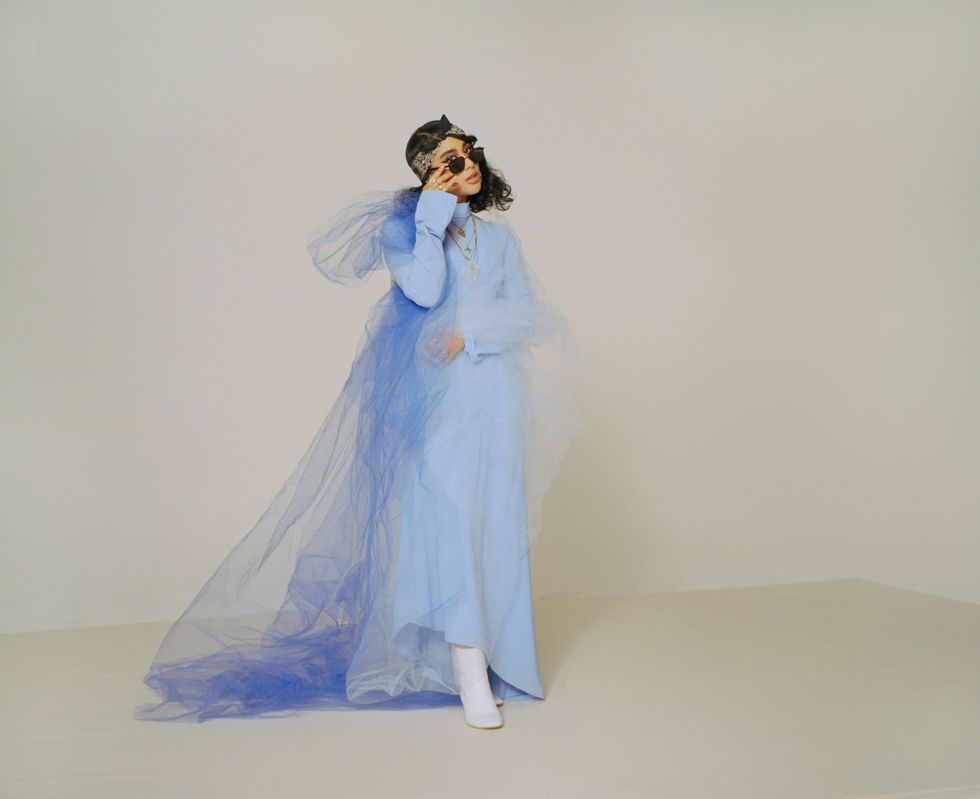
Dress and Boots: Ellery
Sinclair was raised partly in Bradford by her father, who is of Afro-Jamaican descent, and her Uruguayan mother, then partly throughout Spain and England. She says her South American grandmother also helped raise her. This travel growing up was due to her father's business dealings, which she says toed the line between high-profile and illegal, and had the family "running from the cops," her father being in and out of various legal proceedings, and Sinclair taking care of her mother.
As a result, Sinclair felt she never quite fit into her surroundings. A large part of this was due to how her family was perceived publicly, and also how she was treated at school by her peers.
"My parents did their best, but my dad was a certain type of person," Sinclair says. "I love him, and to me, he's always dad. I've often called him a good person, in ways, but others would call him dangerous, a criminal, a yardie, a gangster, a hustler, a dealer, a baron. I really wanted to rescue my mom from that; I really wanted to get away from that, it just felt like chaos all the time, and running from the cops… are you fucking kidding me like, all of the time? And then when trying [to live a] normal life, everyone whispers about you and who you are and where you come from and what your family's about. And if they don't, they're going to think that about you anyway because of how you look."
Sinclair was heavily scrutinized for sharing her father's likeness — her skin was naturally darker and her hair kinkier. "It was so different from how my brother was treated, who looked more like my fairer-skinned mother, and was treated like a white or Spanish person," she says. "People would say the most awful things, calling me names like dirty nigger bitch, or saying that my mom had jungle fever or was a monkey fucker."
As a teen, Sinclair escaped through poetry and theater, a distraction away from her chaotic home and school lives.
"When I was a kid I wanted to be a poet, as if that was a real job, and I had a very immediate sense of words," Sinclair says. She soon fled to London after successfully getting into the National Youth Theatre, which is like "the Royal Shakespeare Company for kids," and though she was only 13 upon admission, (normally you have to be 16), she saw it as a potential ticket out of her situation. Sinclair made trips back and forth to study and work odd jobs in TV and theater to help support her family. Right as she was turning 15, the year her parents lost everything, she'd managed to scrounge up enough cash to buy a "really cheap, not-great house" that had been owned by government housing authorities, with the co-sign of a guarantor.
Once living on her own in London, Sinclair started sneaking into nightclubs and trying to meet "managers and DJs, anyone who might have been producers and have studios so I could get some studio time, knowing that I had all these stacks and stacks of poetry, prose, and essays." Around this time, Sinclair had also given up acting, knowing she wasn't meant to tell anyone else's stories but her own.
---
By 16, Sinclair had recorded a series of demos that merged her love of poetry and spoken word to hip-hop-inspired pop music. This eventually got the ambitious teenager signed to her first management and label deal, as Verbalicious. Of this time, Sinclair recalls, "My team was so shady, it was insane."
She experienced minor success with a song called "Don't Play Nice," which has a cute, fashion-themed video that Sinclair is actually not embarrassed by today. "I'm 16 and I'm like looking like I'm fucking 10 in the video," she says. "But yeah, it's Nickelodeon realness for sure."
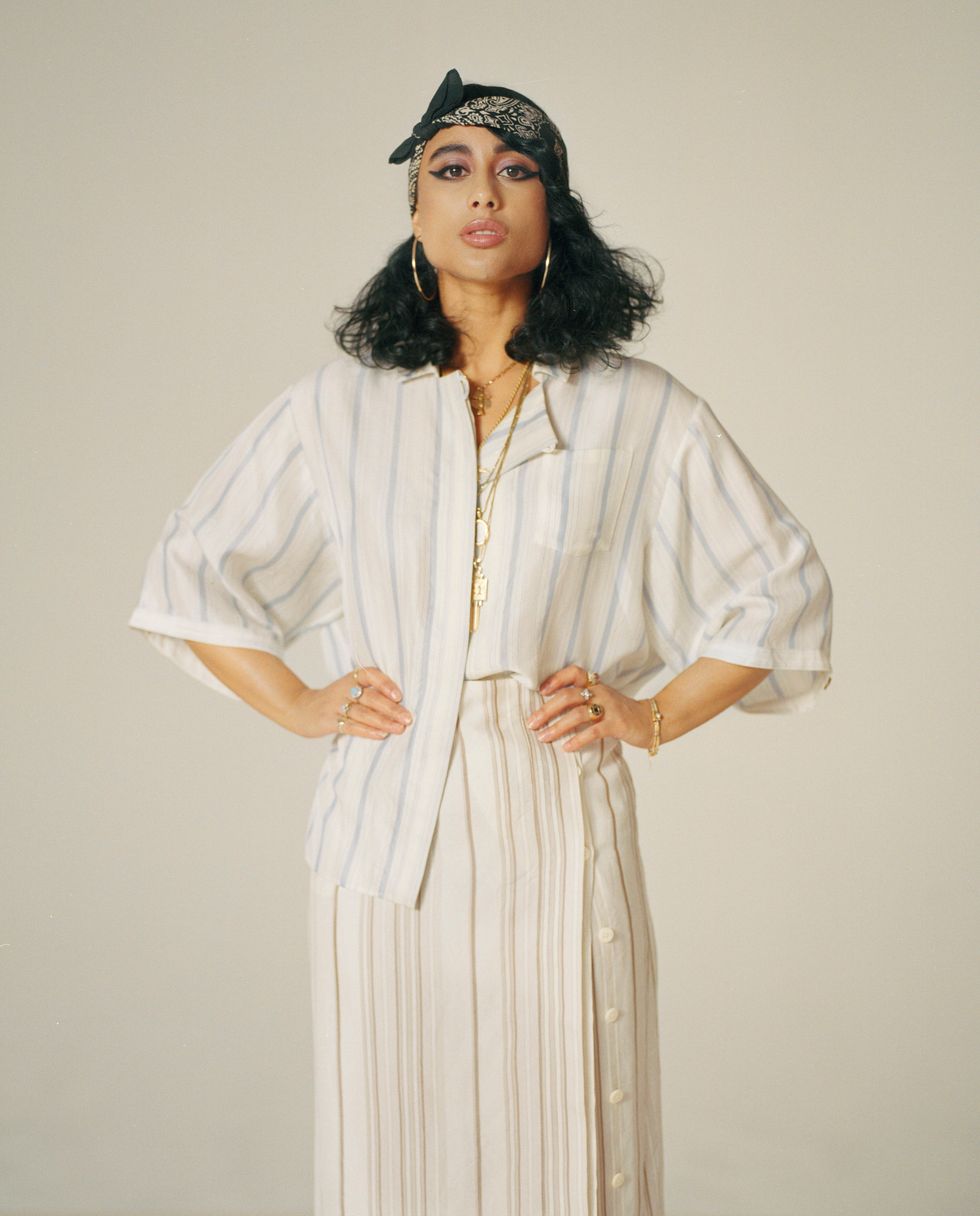
Shirt and Skirt: Jil Sander, Shoes: Clergerie
Then, a couple tracks uploaded to the Verbalicious MySpace page, "Shopaholic" and "Swaggerific," two catchy, upbeat party anthems that almost satirically praised materialism in excess, helped launch Sinclair's next big moves. But not before she hit bottom with her then management team. Since Sinclair was just a teenager, she says it was easier to be taken advantage of, especially since she was embroiled with someone who didn't believe in paper trails, instead relying on his word.
"And anything I got paid for — sales of my single, doing tours and shows — he would be paid and he'd pay me out," she says. "Then suddenly, he'd be like, 'Well, my commission is this, but I had expenses of this to travel to the place and to make the phone calls, for my offices and my overhead,' which, it'd be like having an office on Crosby Street or Wall Street or something."
Eventually the money ran out, and Sinclair had no place to go, so she began her stint of homelessness in London. "I felt good when I got out of that situation," she says, "Not realizing that I was about to start having to sleep on floors, jump train barriers, steal sandwiches from Tesco and the local supermarket, and literally have nothing."
Despite Sinclair's increasingly tough circumstances, when she uploaded her last few tracks as Verbalicious online, it created a bit of a ripple effect in West Coast clubs that ultimately brought her to Los Angeles to pursue her next record deal. And she was, by all appearances, mostly undaunted, due to the armor she'd built up from early childhood on. This resilience supported Sinclair in navigating LA's music scene with unassailable confidence. In the steps she took that helped her land a deal with Interscope Records, including adopting a "more Google-able stage name" to Natalia Kills, Sinclair solidified her own definition of success, based primarily on self-determination, which has stayed with her.
"When people asked me back then what I did, I didn't go, 'I want to make music, I want to be an artist.' I just said I was," Sinclair says. "Because it wasn't not true, I just wasn't famous at it. This is something I've learned more than anything out of a lot of the situations I've been in, but if someone fucks you over or takes away or messes up your success, and you've gone from being here to being there, as I was at that time, where I was 18 and about to release an album to realizing my manager's stealing all my money and my parents were destitute and frantic, and then being like, 'What am I going to do just to get by the next few months?'"
She, of course, realized there were profitable alternatives to being a struggling musician. "I could've sold weed, I could've kept taking stuff that's not mine," Sinclair says. "Why would I want to do that? No one wants to do that. That's survival, that's not who I am, that's not who I was back then, and it never would be. I would walk into those LA joints and just be the 'me' I knew I was, and tell people that so they were treating me the right way, and not the wrong way."
---
It is interesting then that the Natalia Kills project gave rise to a pop star preoccupied, as she was in her Verbalicious era, with the spoils of wealth and excess, even when they yielded consequences ranging from tainted love to losing everything.
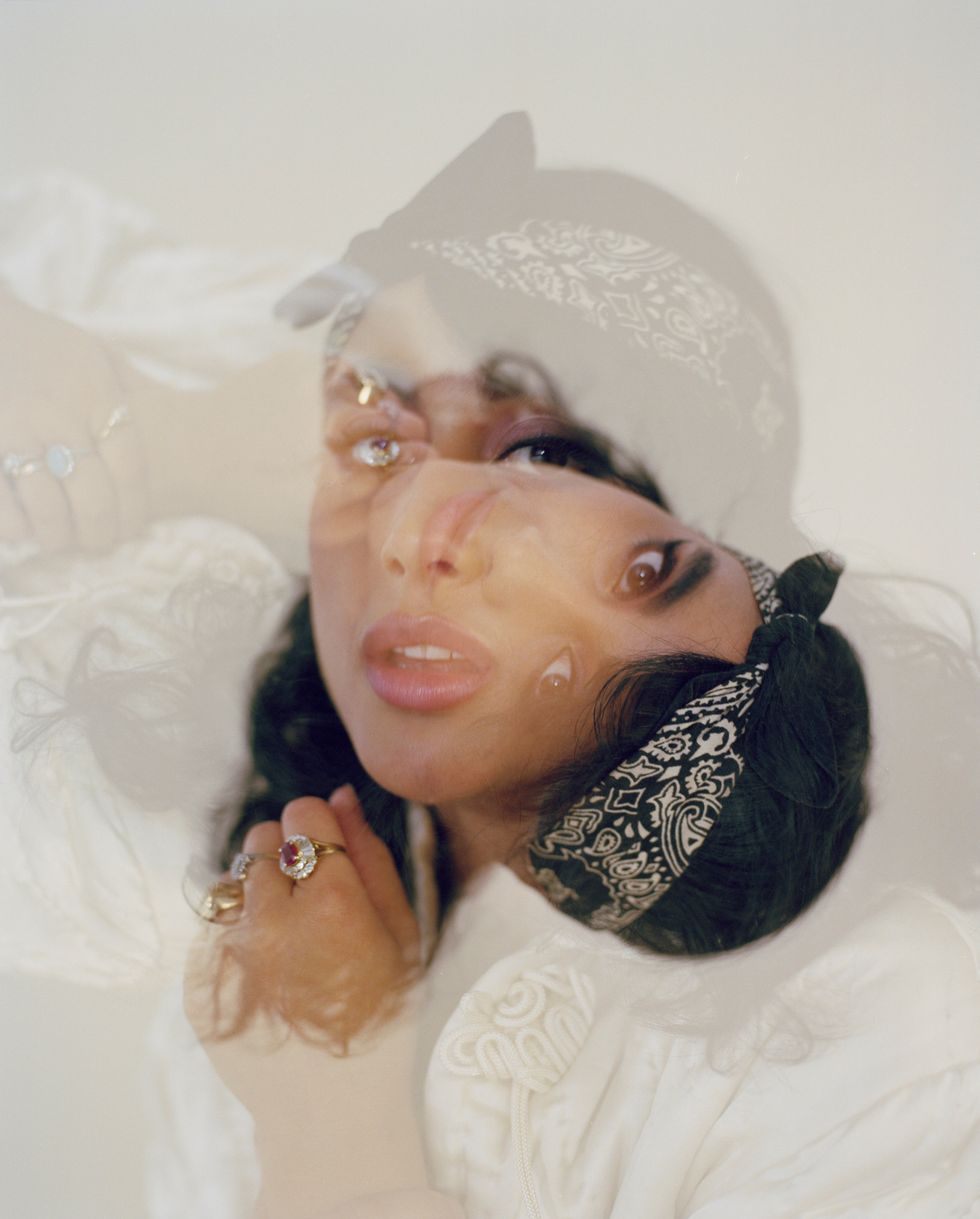
Top: N°21
Natalia Kills singles such as "Free," with will.i.am from her 2011 debut Perfectionist relied on materialism as a sign of freedom, and Sinclair's well-honed eye for high-fashion aestheticism. "Mirrors," a darkly guitar-driven, dance-pop romp that mused on vanity as kink, had a similar mission. Looking back on those songs, which Sinclair wrote and often directed the arty noirish videos for, feel both dark and oddly prescient. The Natalia Kills character was like a vessel encapsulating Sinclair's motivation to move past the struggle that marked her youth. Through Natalia Kills, Sinclair could embody opulence, elevated class status, and occasionally villainous notoriety, as a way out and, more important, a way towards freedom. "I'm free/ I just spent all my money/ but I rocked that like it don't cost a thing," she sings on "Free," with a music video that features Natalia Kills in a box filled with cash.
Isn't this escapist idea precisely what the American Dream promises?
Sinclair considers this. "The thing about America that I love is that it has a really celebrated culture around that mentality of going after what you want without apology," she says. "They don't see it as showing off; they don't see it as delusional to be what you want — not in sitting on your ass, but in doing everything it takes to make yourself the best. Passion is something I don't really think you can teach."
This passion followed Sinclair through the second Natalia Kills album, 2013's Trouble, recorded with early-Lana Del Rey sound architects Jeff Bhasker and Emile Haynie. The project was significantly more autobiographical than Perfectionist and relied less heavily on dance-pop in favor of moodier, more textured electronic production. Singles such as "Saturday Night" potently chronicled the chaos in Sinclair's home and her wild teen years. "Another fist, another wall/ We lose ourselves we lose it all/ I wrote him a hundred times/ Can you hear my heart through the prison bars?/ The boys I kiss don't know my name/ The tears I cry all taste of blame/ Bad luck and dirty cops/ I'm a fucking teenage tragedy."
From the Natalia Kills phase of Sinclair's career, Perfectionist peaked at #134 on the Billboard 200 chart, and Trouble came in at #70. But those stats mean little, as music becomes more reliant on digital streaming numbers. All the videos on Kills' still-active YouTube channel total more than 37 million views, and as of this moment, there are still nearly 400,000 monthly active listeners on Kills' Spotify page.
None of those figures are bad at all for a woman who was, only a few years ago, told in an online torrent that her career was over and that she should probably "do everyone a favor and kill herself."
---
Sinclair is nibbling on a margherita pizza slice in her ornately decorated, cozy studio apartment in Soho. She sits cross-legged on the floor of her home recording studio, where some of the music she makes with her husband Willy Moon as Cruel Youth is born. This intimate moment is in stark contrast from the pop star who was instantly disgraced and vilified just a few years prior, when Sinclair and Moon became judges on the second season of New Zealand's edition of The X Factor back in 2014.
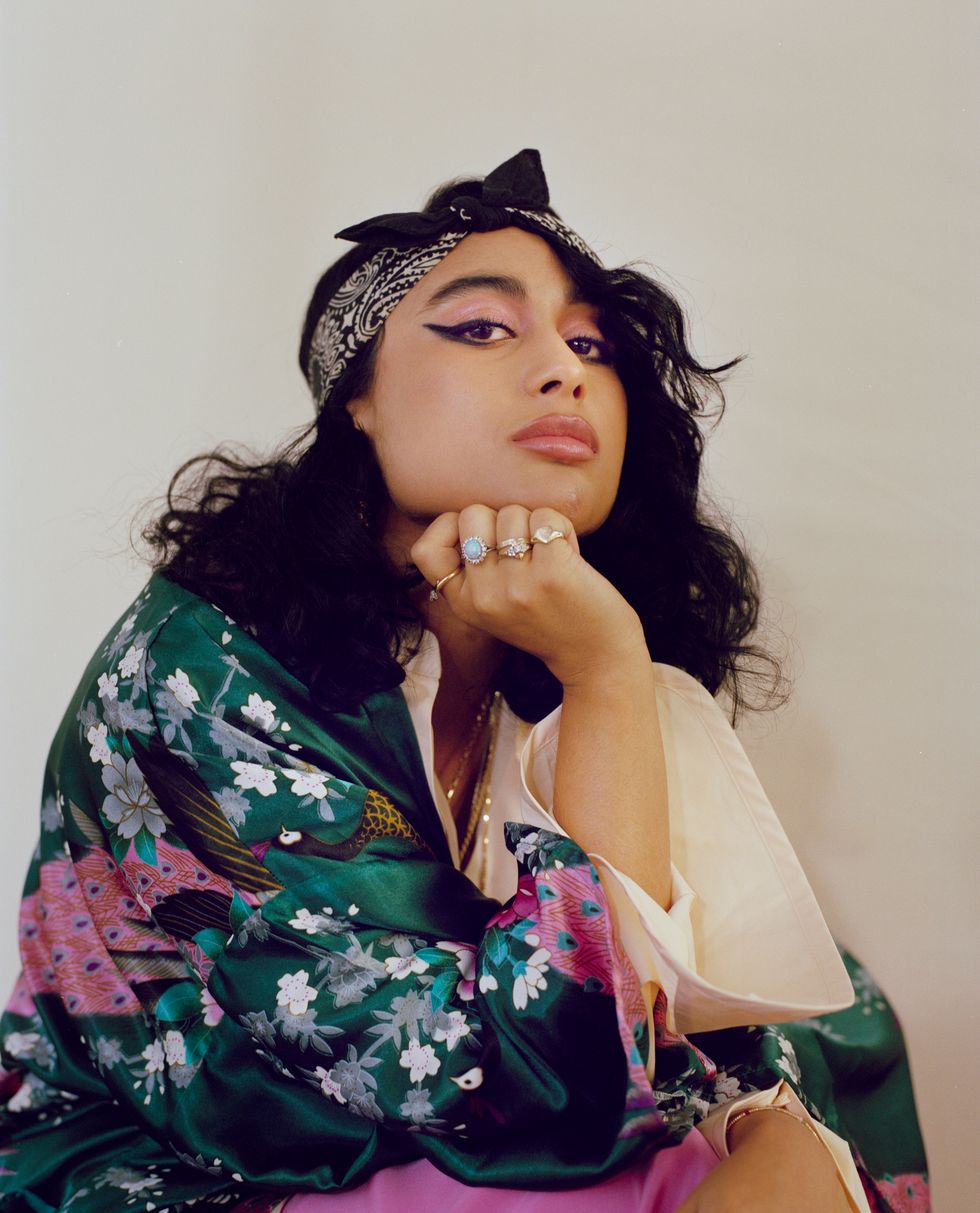
Shirt: Jil Sander, Pants: Etro
Now that we've made our way through Sinclair's twisty story of loss and stardom, here is the single moment that the Internet would have one believe ruined everything she'd built.
During the March 15, 2015 episode of X Factor NZ, contestant Joe Irvine sang a rendition of jazz classic "Cry Me a River," which has been sung by everyone from Ella Fitzgerald to Michael Buble, for the judging panel which also included season one's Stan Walker and Melanie Blatt.
After the performance, Walker and Blatt gave glowing reviews. Then, the camera panned to a scowling Sinclair who paused before deliberating. "Ladies and gentlemen, is it possible that we have a doppelganger in our midst?" she opened. "As an artist who respects creative integrity and intellectual property, I am disgusted at how much you have copied my husband, from the hair to the suit, do you not have any respect or any value for originality? You're a laughingstock. It's cheesy, it's disgusting." The audience booed and shouted.
She went on between cuts of the judges' reactions and Irvine smiling and nodding awkwardly: "I personally found it absolutely artistically atrocious. I am embarrassed to be sitting here having to even dignify you with an answer of my opinion."
Moon joined in: "I found it a bit creepy. I thought you were going to stitch someone's skin to your face and kill everybody in the audience. But: do you."
In the past, this type of harsh criticism was commonplace for reality show judges like Simon Cowell, but in 2015, it wasn't warmly welcome. Online, the backlash against both Sinclair and Moon was intense and instant. On Twitter: The whole of NZ hates you. Cleopatra wannabe. Bullies. On Facebook: Cunts. Slut. Choke on your husband's 4-inch cock and die. No one knows who you are or what you've done. Kill yourself. Stuck up bully.
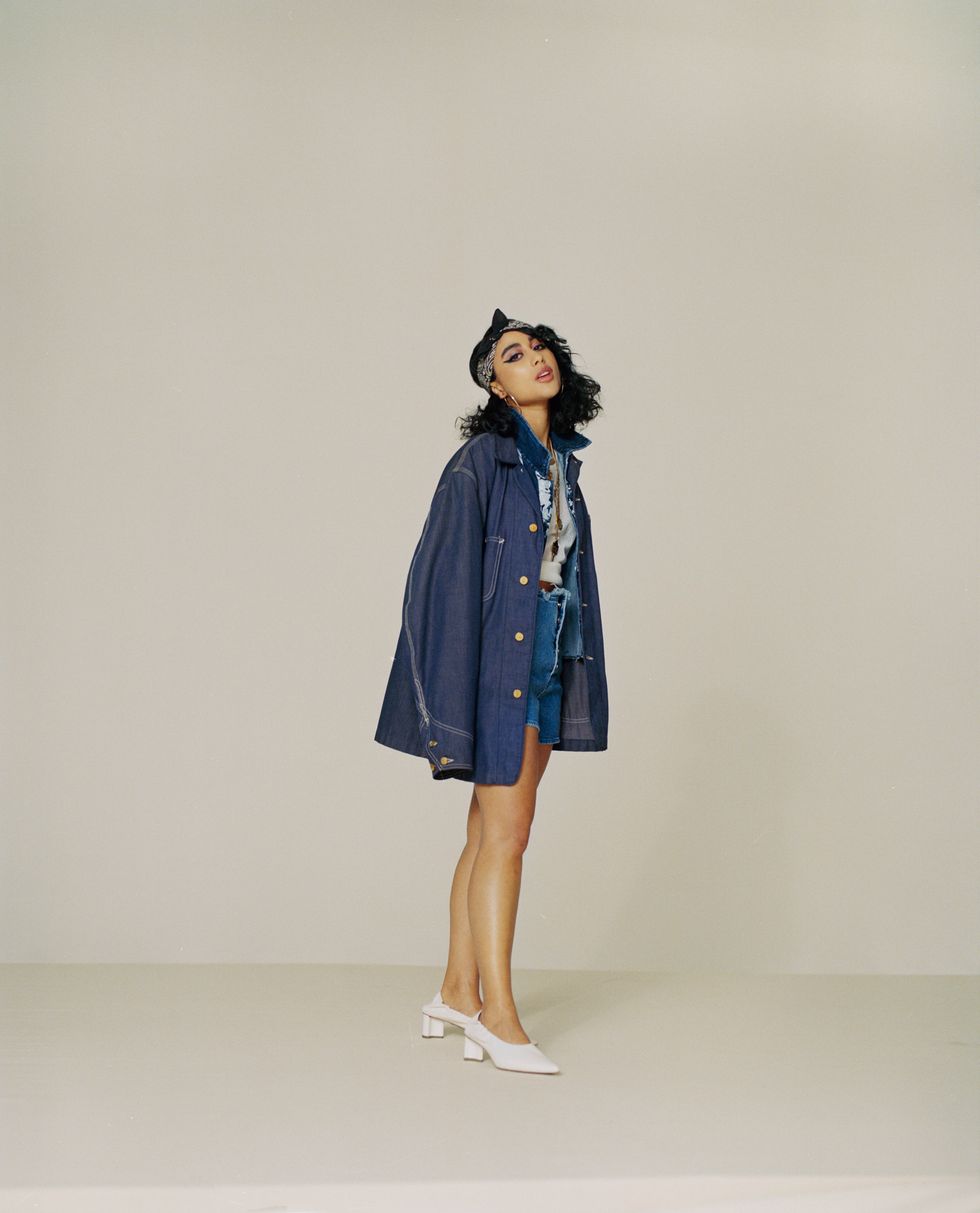
Jacket: Levi's, Shirt and Shorts: Marques Almeida x 7 For All Mankind, Top: N°21, Shoes: Clergerie
From the outside, we saw that Sinclair and Moon were promptly dismissed from the show's judges' panel. That Irvine gave interviews where he said he was traumatized. And that Sinclair wrote an apology and explanation for her on-camera behavior, in a now-deleted tweet dating back to March 19, 2015: "At last! I am relieved that I'm finally able to break the silence. a lot goes on behind the scenes of a reality TV show and you see isn't always the whole story. The show brought me on to bring my passion, dramatic expression and perspective. I was encouraged to be outspoken and things got out of hand." She also offered an olive branch to the shamed contestant. "Joe," she wrote, "I hope you can forgive me and I wish you all the best! Be natural, unconventional and be you!"
This is what we've seen. What we don't know is that Sinclair, for various legal reasons, can't talk about whether or not that fateful moment was real or fake, until I ask her directly.
"All I can say," she says, now solemnly staring into space. "Is that I can't talk about X Factor itself. I can say that I'd never support anything like what I did on TV. If I were someone else watching me, I'd think I were Satan, too. I'm not a victim here because I was there. I did that. On television."
What we also don't know, until now, is that what was broadcast yielded more than nasty comments online. "The thing that felt sad at the time, was sometimes there's a voice in my head… it felt like sometimes you wake up screaming on the inside like, if I just told the truth, everyone would know and these 20,000 death threats would go away. And not just death threats for me, but for my family as well," Sinclair says.
The memories flood back to Sinclair, and she begins crying. What she can't say most likely holds the truth about that episode's taping. What she can say is that those awful, racist comments she heard too often as a child resurfaced online, alongside the death threats. In Sinclair's mind, those "far eclipse whatever reason any of this happened in the first place." Some of the worst advocated for ethnic cleansing, said that Moon would get AIDS from being involved with her, and that she deserved to be "lynched from a tree."
Sinclair says it would be legally risky to say much more. She is mindful of the fact that she is still helping to support her mother. "I love her too much," she says. "It's just not worth it."
---
If onlookers only paid attention to comment sections online, they'd likely believe Sinclair's career was in fact over after all of that. Her social media presence as Natalia Kills essentially vanished and all projects under that moniker came to a screeching halt, but that was because she says she was finally was out of her Interscope contract, not because she was hiding.
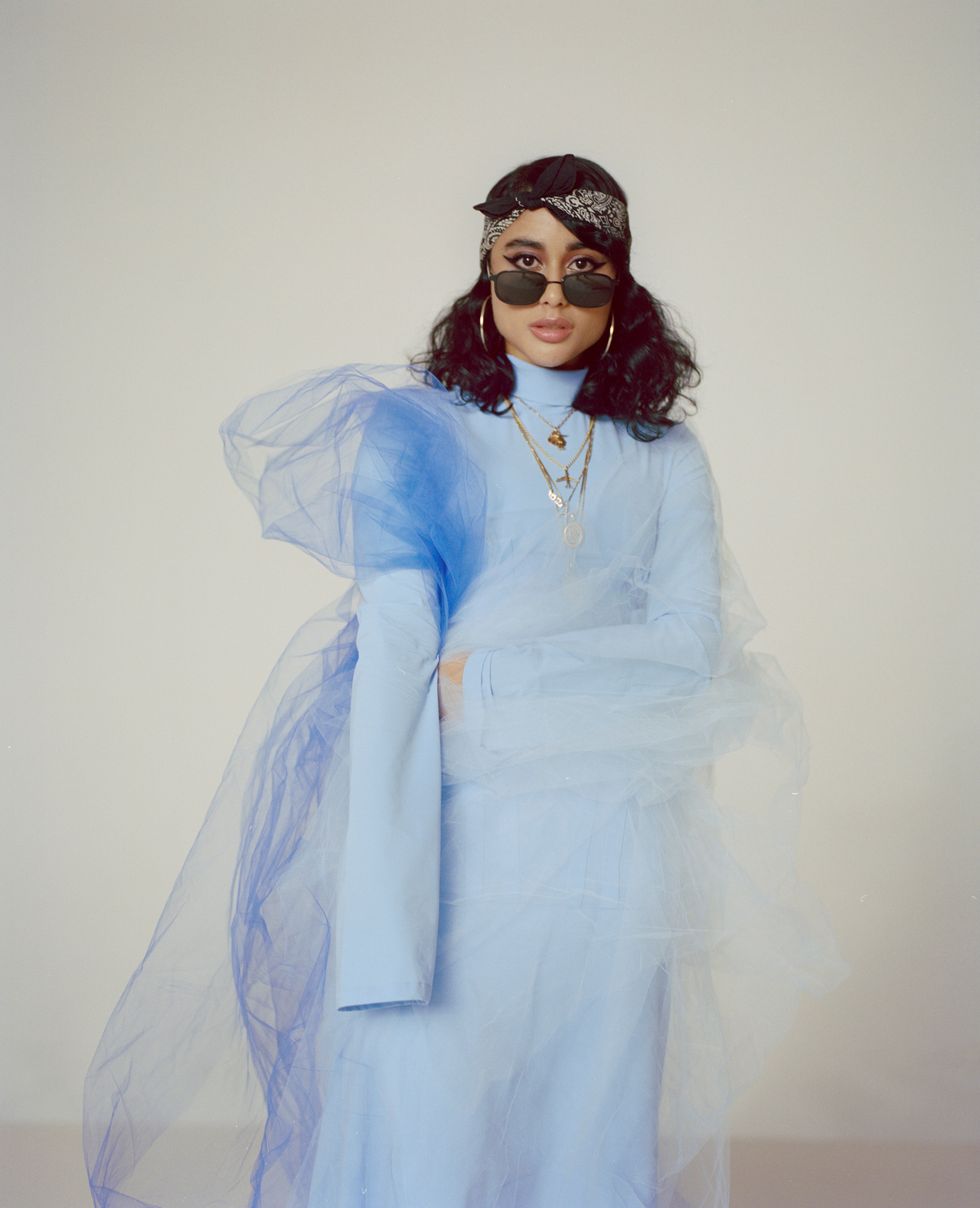
Dress: Ellery
Now, when Googling "Natalia Kills," search results are divided between think pieces and threads concerning the X Factor incident, which Sinclair describes today as a "really bad 48 hours." But 48 hours later and counting, when Googling "Cruel Youth" or "Teddy Sinclair," a refreshing crop of search results emerge.
Writing credits for songs like Rihanna's "Kiss It Better," or Madonna's Kanye West-produced Rebel Heart deep cut, "Holy Water"; co-writing and production credits for new and upcoming music by rising electropop singer Kiiara; Cruel Youth's debut 2016 EP and new songs this year — songs she reaps full financial benefit from. A modest following, by today's standards, of just under 100k followers. Today's release of "Portrait of a Female."
The song is a double-entendre — a portrayal of a woman enamored in multiple ways while in the throes of passion. "When I am with you, my hands are tied/ Literally, unconditionally/ It ain't love if it don't hurt/ No safety word." Smartly, it frames Sinclair's narrative of sexual autonomy with '60s girl-group wall-of-sound pop. After several listens, it becomes clear that "Portrait of a Female" is the tale of a woman unapologetically devoted to her lover, and most of all, to herself.
"I'm not acting anymore," Sinclair says. "I'm not going to play a part, I'm not going to be mean or meaner. Try to pay me now to be something that I'm not. There isn't a price on it."
It would appear that up until this point, as it concerns Teddy Sinclair, we've gotten it all wrong. Those who once wished her death can't keep her down. "Nothing can make me feel like all the things people have said about me," she says. "Because it's not true, and it's not me, and I'm better than I've ever been."
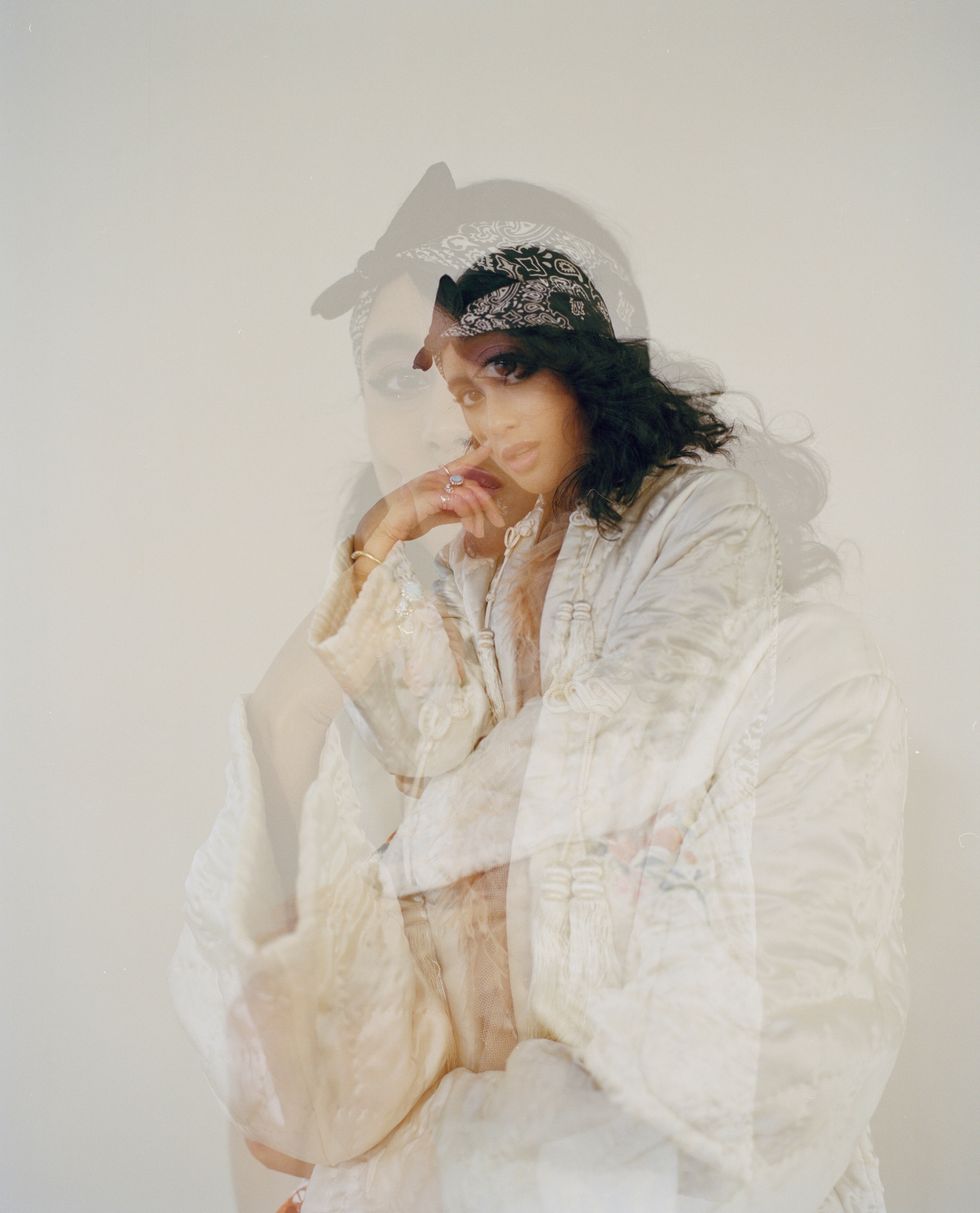
Top: N°21
Photography: Simon Heger Knudsen
Styling: Scott Shapiro
Makeup: Olivia Barad